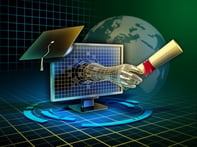Published on
Using Technology to Drive Excellence in Online Education

The Internet of Things (IoT) is how you live, whether you accept that premise or not. You either have a smart device in your pocket, on your wrist, use a pad device, or some type of device that manages, checks or tracks your life. Online learning fits nicely into IoT.
What is the best online experience and why would it be different from any other education experience? Is the best online experience blended, is it competency based, is it hy-flex, could it be a boot camp, is it a state promise? What exactly is it that defines excellence in online education?
Excellence, as a term, suggests a point-in-time evaluation—something we achieve. Excellence could also suggest metrics we apply. Of course in some ways metrics run counter to the foundations of the academy. Academic freedom provides faculty the right to design an educational experience using their expertise that best fits the pedagogical approach to the needs of their students.
There are online program designs that adapt learning to the abilities of the student, with built-in remediation based on the learning map. Adaptability allows learners to begin where their abilities are and end at a common outcome. Measured progress leads to a common measurable outcome; if students use the tools to engage in remediation or additional practice or group work. Is that excellence in design?
Unfortunately, there’s little mention of measureable retention results or long-term success. Online learning does one thing most modalities do not: it matches learning with lifestyle. The lifestyle of all we do is integrated with technology of some type. IoT represents the seamless integration of life and technology. It’s is changing everything from how we conduct business to how we research to learning.
IoT creates discussions on AI (artificial intelligence) and AGI (artificial general intelligence) when the machines not only think and do but evolve beyond our ability to enhance human intelligence. IoT also begins to seamlessly integrate the use of technology with life. We no longer use technology; technology in the IoT age is how we live. Today’s students conduct research through Google searches before opening books, use apps to buy movies tickets, make new friends, date, shop and connect online. Is this excellence or singularity?
As online education becomes more adapted by a wide range of institutions changes will continue to be made maximizing the opportunities created by IoT. For example, for the past several years we have been reading about mobile learning (mLearning), and this is a good start. IoT allows deeper connections with and between students in new ways, from something as basic as reminders on assignments to helping students connect to the real world immediately. Technology that artificially begins to recognize learning moments could make online learning more than logging into a website. It could be an ongoing experience. Back to the original question on defining excellence, excellence in a technology age becomes an experience that is ongoing, not building- or time-based.
New models of excellent online education could include access to help resources on demand using knowledge bases and AI to provide help whenever needed. The advances in video and AI could make learning accessible to any student from any institution with interaction, adaptive learning experience, face-to-face lessons and more. Imagine walking down the street and seeing something you learned in a biology class, you interact with your smart device and begin a discussion of what you are seeing, maybe using the camera to allow the smart device to identify what you see, classify or define, and learning happens in a real way not possible in other modalities.
We’ve always had experiments, and building-based experiential learning environments, real by design but not dynamic. Buildings were great places for learning when all of what we did in life happened somewhere, at a time, with a specific paperbound text and specific instructor. Digitalization and Internet technologies have shown we can get answers and information at our fingertips. We use phrases such as “Google it” when we have questions. Social media has proven we can share an event anytime, use video to connect and move from time bound to sharing anytime. Much of this and the benefits has not been fully integrated into education.
IoT will create dynamic social learning environments that could make the first significant decrease in the need for buildings, multiple colleges and universities. Excellence will be defined as how seamlessly learning can be delivered to the learner, not in the number of buildings endowed or the number of external sites built. This will change the cost model dramatically and make better use of cloud-based technologies.
IoT will also change assessment of learning. Assessment can become more precise, it will move from a point in time (test, quiz, submitted assignment) to a continuous activity for the duration of the education experience. You will be assessed on what you are continuously learning to the point of education award (degree, certification). We could even see the breakdown of distinction titles to something more reflective of lifelong active learning. Is all of this science fiction or something we should grasp as the reality soon upon us? Many would lament losing many of our buildings and monuments to education excellence, while many more see some of the decline in education achievement as an organization that failed to match the needs of the people with how the people’s lives changed.
Excellence in online education must move to finally create dynamic, integrated, learning experiences. We will see excellence when we no longer compare an online class to a building class but have education that matches to the lifestyles and needs of those desiring education.
Author Perspective: Administrator
Author Perspective: Community College



